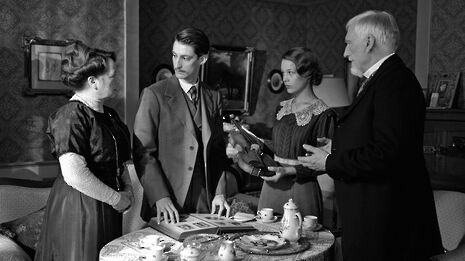Review: Ashen eloquence in ‘Frantz’
Finding Ozon’s latest film a heart-wrenching tale of loss, Laura Shen reflects on the power of colour in cinema, and the emotions its absence can convey.

Anna, a German woman who lost her fiancé (Frantz) during the war, meets an enigmatic Frenchman (Adrien) who places flowers on her lover’s grave. Though he claims to be a friend from Paris before the war, his abrupt departure seems to claim otherwise. Drawn into another world in search of Adrien, Anna looks for the answer she is desperately hoping for.
“After comfortably living in a black-and-white film, the dynamism of colour and its implied merriment are almost painful – the bittersweet remembrance of lost love.”
The first shot in Frantz depicts a quaint Quedlinburg with its colours stolen away. In the distance, the emerald trees glisten, but the town is unmistakably grey, introducing the film's ashen atmosphere. The colourful trees cruelly tease at a possibility of happiness that is ultimately imaginary. The technicolour era seems to be but a dream, blissful yet distant. François Ozon has placed a grave filter on the world. The dullness drives home the abject depression felt after the war – victory or defeat, suffering is everywhere. The bleak atmosphere is perpetuated by the grey as Frantz’s loved ones attempt to carry on.
Occasionally, Ozon lifts the ashen veil and the cinema is momentarily flooded with colour. So conditioned to the monochrome, these shots no longer felt real – the vibrant images those of a fairy tale. The colours highlighted dream-like states and sharply contrasted the happy tales of Frantz’s life. After comfortably living in a black-and-white film, the dynamism of colour and its implied merriment are almost painful – the bittersweet remembrance of lost love. Ozon masterfully manipulates the chromaticity to entice from us the feeling of longing, briefly freed from the bleak realism, and we become his willing subjects.
Anna travels from Germany to Paris – whether it be to escape the tragedy, to find meaning, or look for the Adrien, her adventures promised a satisfactory explanation for the loss of Frantz. Her idealised Paris, regrettably, proves to be far from romantic. Along the way, screaming train whistles accompany her, devouring the hope for peace. She painfully scrambles for the poetic Paris, while looking for any remnants of Frantz himself. Her reality is played with as she tries to rove through France, creating tantalising tension between her and a dead man. The revelations Anna comes to undermine her ideas of the past; the audience is too struggling to form some kind of understanding, but the uncertainty of whether or not an explanation is even feasible keeps us wholly in suspense.
Though the film may toe the line between reality and dream, its subject is undeniably concrete. A war film without war, Frantz is neither bloody nor action-packed. Yet its tragedy could not be more acutely felt. War changes perceptions, and Anna’s struggle to find reality exposes the psychological damages war leaves behind.
François Ozon ingeniously articulates the bleakness of loss and the mania of escapism in the eloquent feature of Frantz
 News / Colleges charge different rents for the same Castle Street accommodation2 March 2026
News / Colleges charge different rents for the same Castle Street accommodation2 March 2026 News / News in Brief: waterworks, wine woes, and workplace wins 1 March 2026
News / News in Brief: waterworks, wine woes, and workplace wins 1 March 2026 News / Climate activists protest for ‘ethical careers policy’1 March 2026
News / Climate activists protest for ‘ethical careers policy’1 March 2026 News / Angela Merkel among Cambridge honorary degree nominees27 February 2026
News / Angela Merkel among Cambridge honorary degree nominees27 February 2026 News / Private school teacher who lied about Cambridge degree barred from teaching27 February 2026
News / Private school teacher who lied about Cambridge degree barred from teaching27 February 2026









